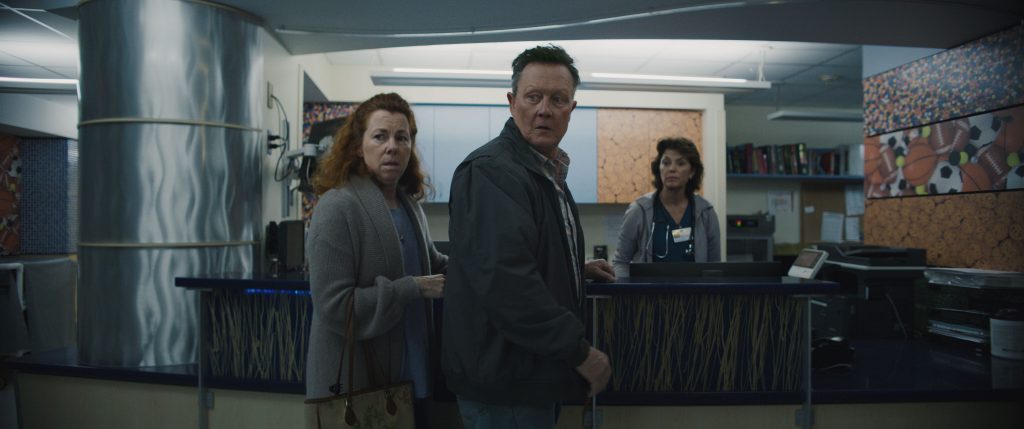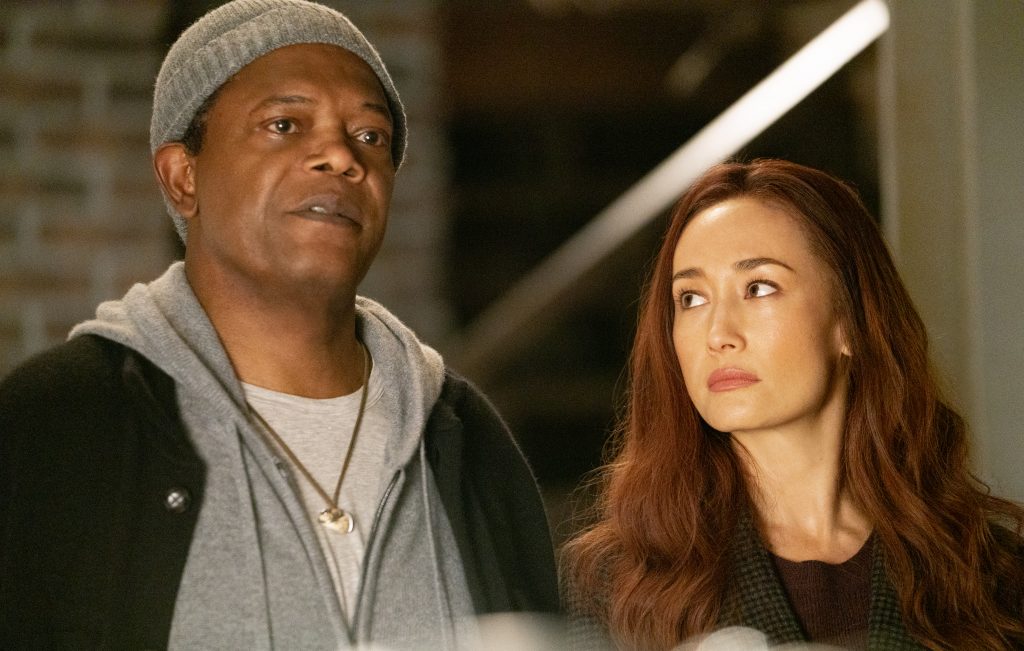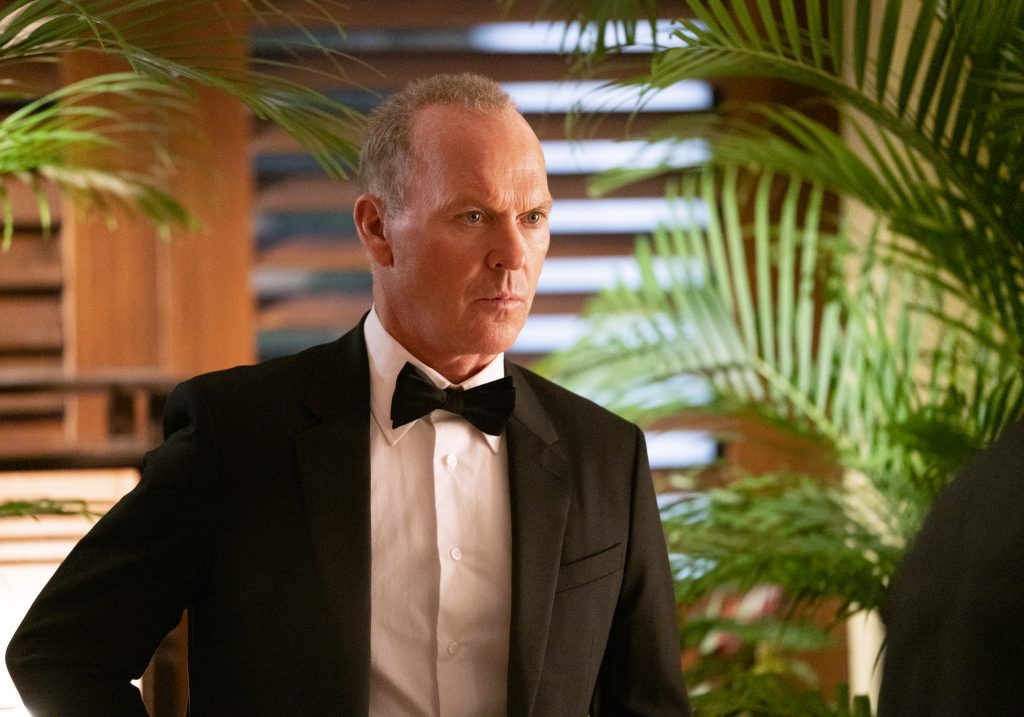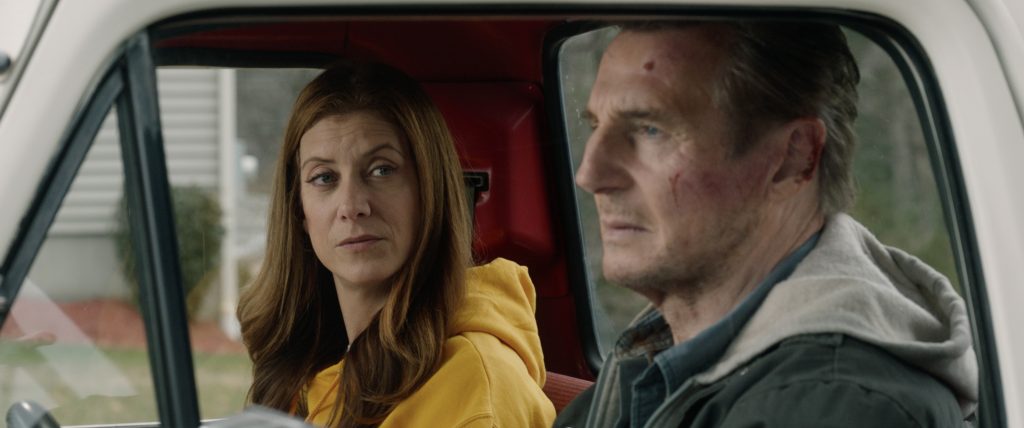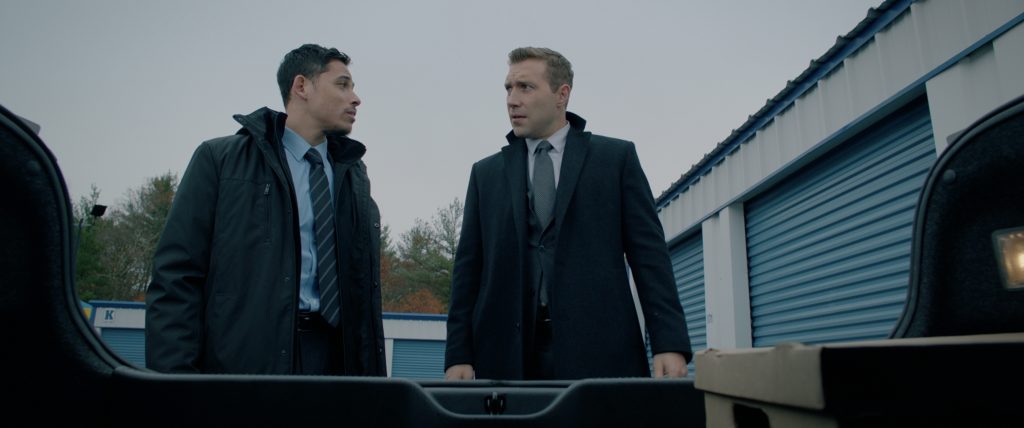October 14, 2023
by Carla Hay

Directed by Vibeke Muasya
Culture Representation: Taking place in 2020, in the fictional U.S. city of Trudyville, the dramatic film “Shelter in Solitude” has a predominantly white cast of characters (with a few and African Americans) representing the working-class and middle-class.
Culture Clash: A down-on-her-luck bar owner, who has to temporarily shut down her bar because of the COVID-pandemic, takes a job as a prison guard, and she develops an unlkely friendship with a death row prisoner whose execution date is in a matter of days.
Culture Audience: “Shelter in Solitude” will appeal primarily to people who are fans of star Siobhan Fallon Hogan and movies about ordinary people in unusual situations.

“Shelter in Solitude” is a little uneven when it awkwardly tries to balance comedy with the drama of the main story. Good acting saves what could have been a very trite movie about an unlikely friendship between a death row prisoner and a prison guard.
Directed by Vibeke Muasya and written by Siobhan Fallon Hogan, “Shelter in Solitude” (which takes place in 2020) has a meandering quality to it that might or might not turn off viewers. The movie’s trailer shows that the emotional core of the story is the friendship that develops between the prisoner and the prison guard. But that doesn’t happen until the last half of the movie.
Muyasa and Hogan previously collaborated on the 2021 dramatic film “Rushed,” which was written by Hogan and in which Hogan starred as a mother seeking justice for her teenage son, who died in a fraternity hazing. Robert Patrick co-starred in “Rushed” as the husband of Fallon’s character. In “Shelter in Solitude,” Fallon and Patrick portray siblings Val Fagin and Dwayne Fagin in the fictional city of Trudyville, which is in an unnamed state in the U.S. South. (Hogan, who’s really from the New York/New Jersey area, has a contrived Southern twang that she plays to the hilt in this movie.)
In the beginning of the story, Val (a bachelorette in her 60s with no children) is trying not to feel like a failure. When she was in her 20s, she moved to Nashville to try to make it big as a country singer. It didn’t work out, and now she’s being making a modest living as the owner of a bar called Val’s Tavern, where she occasionally gets up on stage and sings. Val has owned Val’s Tavern for the past 29 years. She can get rowdy when she’s drunk.
As shown early in the movie, Val has a tendency to have meaningless hookups with men who are no good for her. One of them is Kevin (played by Michael Oberholtzer), a musician who’s young enough to be her son and who plays guitar whenever she needs a band to perform with on stage. Kevin’s father was a meth addict, and it’s implied that Kevin has substance abuse problems too. Real-life rapper Robb Banks and musician Fat Mike have cameos in the movie, with Banks as a drug dealer and Fat Mike as a rapper.
Val’s protective brother Dwayne gets in a fight with Kevin at the bar because Dwyane doesn’t think Kevin respects Val. Another person who looks out for Val (but doesn’t get invovled in her love life) is a local cop named Chris Sullivan, also known as Officer Chrissy (played by Peter Hogan), who is easygoing and friendly, but doesn’t have much to do in this movie. (Peter Hogan is Siobhan Fallon Hogan’s real-life son, so it looks like this was a nepotism role.)
Dwayne is the warden of the local prison, but his life is also a lonely mess. Dwayne, who is a divorced father, is still bitter that his ex-wife left him because Dwayne is impotent. Dwayne pays child support and complains that he doesn’t get to see his underage kids as much as he would like to because his ex-wife won’t let him. There are hints that Dwayne cheated on his ex-wife, which was probably the main reason for the divorce.
At the prison, a mild-mannered prison guard named Sam (played Dan Castellaneta) is quitting to retire, after 32 years on the job. Dwayne is preoccupied with finding a replacement for Sam. Another big concern for Dwayne is the upcoming execution of a death-row prisoner named Jackson (played by Peter Macon), who is asking the state governor for clemency to stop the execution. Jackson is on death row for brutally murdering a man, but Jackson claims that the killing was in self-defense.
Jackson’s upcoming execution is all over the local news, but something even bigger happens that takes over the news: the COVID-19 pandemic and the shutdowns of “non-essential” businesses that require in-person contact. Val’s Tavern is ordered to be shut down. Val was already financially struggling (she had to borrow $200 from Dwayne because she was late on mortgage payment because she had to pay for a leaky roof), and now she’s losing her Val’s Tavern income for an unknown period of time.
When Val hears about Sam retiring from his prison job, Val’s solution to her problem is to get a job as a prison guard to replace Sam at the prison where Dwayne works, even though Val has no training or experience in this job. She’s able to convince Dwayne to hire her because she knows he has the power to do it without anyone questioning him. The prison is so behind-the-times, it doesn;t even have a computer system.
On her first day on the job, Val meets Jackson, who is standoffish and refuses to speak to her at first. Slowly but surely, Val is able to get Jackson to open up and trust her. Jackson, who is a divorced father, tells her about his adult daughter Eveyln, whom he has been writing letters to while he’s been in prison. And when Val hears Jackson’s story about the crime that landed him on death row, she becomes emotionally invested in preventing his execution.
“Shelter in Solitude” leaves any previous comedic tone behind when it gets to this part of the story. Val starts to see that her problems are nowhere near as big as Jackson’s problems, while Jackson begins to understand that not everyone who works in law enforcement is the enemy. There is no romantic attraction between Val and Jackson. They unexpectedly find comfort in each other as friends.
Val and Jackson are both tough and tender in different ways. Siobhan Fallon Hogan and Macon give solidly capable performances. The best scenes in the movie are when their characters Val and Jackson are just talking. “Shelter in Solitude” adeptly shows that quiet conversations can led to powerful moments in connecting with other people.
Foxglove Entertainment released “Shelter in Solitude” in select U.S. cinemas on October 6, 2023.

